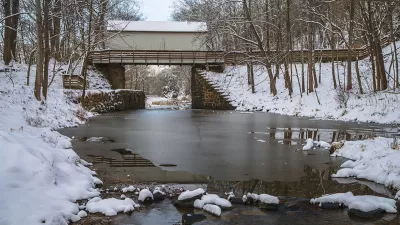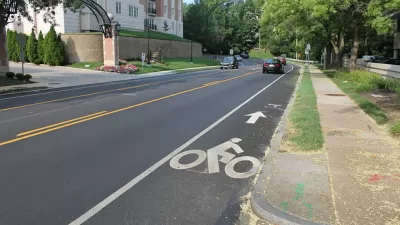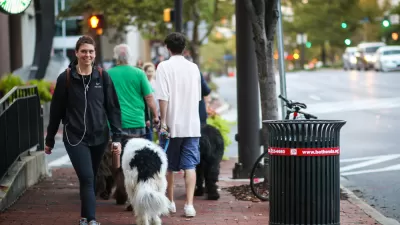Concepts like erasure, greenfield development, and easements figure into this story about a rural community on the fringes of suburban development in Maryland's Montgomery County.

"The 'Farm Road' case in Maryland’s Montgomery County is a troubling example of rural gentrification and historical erasure," according to an article by David Rotenstein.
The process of rural gentrification described is the result of a widening "gap in the low value of the property as agricultural versus a potential greater value if it were to be developed," according to Rotenstein. The "rent gap" in rural communities means that working-class residents are at risk of displacement—just as they would be under similar circumstances in urban areas.
After introducing the concept of rural gentrification, as described above, Rotenstein goes on to examine the example of a community formed around the "Farm Road" in Montgomery County—a "historically African American community created by freed slaves who bought land and cultivated farms near Sandy Spring, about 30 miles north of the U.S. Capitol."
The Farm Road at the center of the controversy was a vernacular place name for a route that emerged "over more than a century of agricultural use," but not as a dedicated public right-of-way. In other words, Farm Road didn't exist, which precipitated decisions by the Montgomery County Planning Department to claim that addresses along the road also didn't exist. That lowered property values for homes along the road and led to disputes between local residents and the planning department, as well as local residents and the residents of nearby developments.
Rotenstein provides more details about the legal fallout from the controversy, which most recently included a ruling by the Maryland Court of Appeals that went against the residents of Farm Road. An article from 2008 by Margie Hyslop provides more details about the controversy as it unfolded.
FULL STORY: Farm Road: Rural gentrification and the erasure of history

Maui's Vacation Rental Debate Turns Ugly
Verbal attacks, misinformation campaigns and fistfights plague a high-stakes debate to convert thousands of vacation rentals into long-term housing.

Planetizen Federal Action Tracker
A weekly monitor of how Trump’s orders and actions are impacting planners and planning in America.

Chicago’s Ghost Rails
Just beneath the surface of the modern city lie the remnants of its expansive early 20th-century streetcar system.

Bend, Oregon Zoning Reforms Prioritize Small-Scale Housing
The city altered its zoning code to allow multi-family housing and eliminated parking mandates citywide.

Amtrak Cutting Jobs, Funding to High-Speed Rail
The agency plans to cut 10 percent of its workforce and has confirmed it will not fund new high-speed rail projects.

LA Denies Basic Services to Unhoused Residents
The city has repeatedly failed to respond to requests for trash pickup at encampment sites, and eliminated a program that provided mobile showers and toilets.
Urban Design for Planners 1: Software Tools
This six-course series explores essential urban design concepts using open source software and equips planners with the tools they need to participate fully in the urban design process.
Planning for Universal Design
Learn the tools for implementing Universal Design in planning regulations.
planning NEXT
Appalachian Highlands Housing Partners
Mpact (founded as Rail~Volution)
City of Camden Redevelopment Agency
City of Astoria
City of Portland
City of Laramie




























